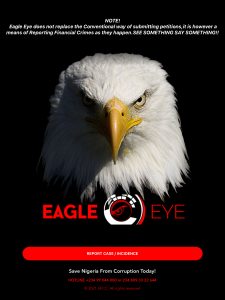The Economic and Financial Crimes Commission (EFCC) recently inaugurated a data-collection mobile application (app) to enhance its intelligence gathering efforts at fighting corruption.
The technology, codenamed “Eagle Eye’’, seeks to boost public participation in the fight against corruption by easing the process of reporting economic and financial crimes to the commission.
A major complaint by anti-graft agencies in the country has been that Nigerians are generally reluctant when it comes to assisting with vital information on criminals and their activities.
Security experts have long identified this as a major setback in the federal government’s fight against corruption in the land.
They blame the public apathy on certain realities, including lack of confidence in security agents based on experiences, and bottlenecks in the conventional financial crime reporting process, which is based on submission of written petitions by informants.
According to the EFCC, “Eagle Eye’’ is designed to address these and several other shortcomings that have long alienated the public in the government’s anti-corruption crusade.
“Eagle Eye does not replace the conventional way of submitting petitions. It is, however, a means of reporting financial crimes as they happen’’ is a message on the app.
Speaking at the inauguration in Abuja, the Chairman of EFCC, Mr Abdulrasheed Bawa, shed light on two key features of the app and how it would make a difference in the financial crime reporting process.
Bawa explained that the technology was designed to guarantee the anonymity or security of anyone reporting cases of corruption to the EFCC.
He said a unique advantage of the application was the elimination of a direct person-to-person interface in the reporting process, thereby guaranteeing confidentiality and “an added incentive for effective whistleblowing’’.
According to him, it is a significant departure from the conventional reporting channel that requires disclosure of an informant’s identity to the commission.
He said that whistleblowers would no longer have to worry about being sold out by corrupt agents to affected criminals.
The app, which is available on Apple or Google Playstore, does not require registration by a user.
Users have an option to reveal their identities by providing personal information such as name, phone number, e-mail address and contact address.
“With the app, those who hitherto were afraid of report corruption cases to the commission either for fear of being identified by the culprits or having their identities revealed, can now do so with the assurance of full anonymity,’’ Bawa said.
He also explained that the “Eagle Eye’’ app does not only make it easy for the public to share information with the EFCC, it also brings the commission closer to the people, especially those at the grassroots.
It eliminates the burden of paperwork, long-distant travel to an EFCC’s office to submit a petition, and the cost and delays associated with mailing of documents to the commission. The technology also came with a photo upload link.
The EFCC boss said: “Eagle Eye represents a new experience in information sharing and crime reporting between the public and the EFCC.
“With this app, Nigerians and non-Nigerians can easily take a picture of a property suspected to have been fraudulently or corruptly acquired and send to us seamlessly’’.
However, Bawa explained that the app was not a replacement of the traditional way of lodging complaints through lawyers or in-person, adding that the commission would continue to receive information or petitions from individuals the old way.
“We are not going digital completely’’, Bawa said.
Anthony Uzor (not real name), who works in the Federal Ministry of Finance, told the News Agency of Nigeria (NAN) that he had always wanted to submit petitions to the EFCC but did not know how to go about it.
Besides, Uzor said the fear of his identity being revealed to those exposed had also been a major drawback for him.
“If this app is what they say it is, then the two major obstacles holding me back from reaching out to the EFCC have been removed; I think it will also encourage many other Nigerians in my shoe,’’ Uzor said.
According to the EFCC chairman, the initiative is a clear demonstration of his pledge, on assumption of office, to run a technology-driven agency.
“The Eagle Eye will go a long way in aiding the reportage of fraudulent activities of individuals, especially cases of money laundering through the real estate sector,’’ he said.
NAN reports that the information sharing links on the app are divided into four sections — A to D.
Section A, which is labelled “Select pictures/camera’’, instructs users to “capture or select from your gallery picture(s) of suspect/assert/property you wish to report’’.
Section B states location details, that is, the location of suspects or assets or property that users wish to report.
Section C, labeled “Report description’’, asks users to provide detailed description of pictures attached.
Under Section D, labelled “Informant details (optional’’), informants who wish to reveal their identities can do so by providing their full names, phone numbers, e-mail addresses and residential addresses.
Bawa, therefore, appealed to the public to take advantage of the app in bringing cases of corruption and economic crimes to the knowledge of the EFCC.
NANFeatures



























